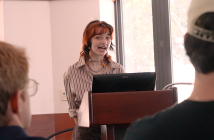Fordham’s clinical psychology program is addressing a critical need in the Bronx: access to affordable mental health services.
The program’s Community Mental Health Clinic, which opened in January 2020, aims to provide low-cost mental health services to the Bronx community while also giving third-year doctoral students the chance to gain practical experience.
The project addresses a significant health issue in the Bronx: According to a report from Montefiore Hospital, 91% of the borough’s Medicaid patients live in “a mental health professional shortage area” based on the ratio of providers to the population and its needs.
“The idea is that we live in one of the most disenfranchised communities in America, where mental health services are extremely hard to come by,” said Barry Rosenfeld, Ph.D., professor of psychology. “We’ve got really well-established faculty members who are often experts in their respective areas. We have really strong graduate students who are invested in providing services to the community under our supervision. And wouldn’t it be really good if we could do something to give back to the Bronx?”
The clinic offers services in four areas—adult psychotherapy, child psychotherapy, adult general assessment services, and forensic assessment. Patients can be referred to the clinic from hospitals, the court system, school districts, and others, or can call the clinic for a screening at 718-817-0590. If appropriate and if there’s availability, the patient will receive an appointment with a third-year doctoral student who is supervised by faculty members. Doctoral students only can spend a few hours a week in the clinic so only have about one to two cases at a time.
Ariella Soffer, Ph.D., GSAS ’08, director of the clinic, said that they’ve seen clients with high needs for depression, anxiety, stress, and trauma, particularly now due to the problems and challenges exacerbated by the pandemic.
“What we’ve been seeing, I think, [is]just a profile of exaggerated need that the nation or New York at large would see,” said Soffer.
Rosenfeld said since they opened they’ve had a waiting list, in part because of their low-cost services.
“It’s a sliding scale. So I think it’s often $5 or $10 for a psychotherapy session, as opposed to maybe $250 [at a private office],” he said. “Our forensic evaluations—we have a set fee that works out to probably $5 an hour.”
Like all organizations, the clinic had to pivot to a new virtual model in March. It had been operating in person at its location a few blocks from the Rose Hill campus at 557 East Fordham Road for “a solid five weeks,” before they made almost all services remote due to the COVID-19 pandemic.
“It’s ironic, in some ways, it makes some things easier, like scheduling,” Rosenfeld said. “I think the field of mental health will probably never be the same; I think we will probably always rely much more on virtual mediums than we ever used to. But I think it’s more challenging to develop a relationship [virtually], to have an interactive exchange.”
Despite the challenges and changes the clinic faced in its first year, those involved said they’re excited to keep the work going and see it grow.
Doctoral Students Receive Supervision and Credit While Serving Community
Plans for the clinic had been discussed for more than 10 years, Rosenfeld said, but really came together about three years ago when Soffer was brought on in fall 2018 as director.
“I spent a bulk of the first year basically trying to figure out—how do other schools do this?” she said. “I had graduate students talking to a lot of graduate students in other clinical programs to try to figure out what works,” she said, particularly when it came to how the work could be integrated into the curriculum so students could receive course credit.
Third-year doctoral students in the clinical psychology program, many of whom already have some practical experience from other externships, are divided into the clinic’s four areas.
Each of the tracks has two faculty supervisors. Instead of taking or teaching another course, the students and faculty work at the clinic for a few hours each week. The teams meet weekly, right now virtually, to discuss patients, best practices, and ideas for care.
“The population is clearly one of the most underserved and high-need populations in the New York area, and so I think it provides that opportunity to the students to offer services to people that are really in need, and I think that the faculty offer some niche expertise,” Soffer said.
For Michelle Leon, a third-year student in the program, the clinic has allowed her to explore the forensic assessment field.
“I’ve always been interested in forensic work, but I hadn’t gotten clinical experience in the forensic field at all up until I joined the forensic assessment team this fall,” she said. “I’m getting more of that hands-on experience in an area that I was always interested in.”
Faculty Expertise Benefits Patients
Rosenfeld and Dean McKay, Ph.D., professor of psychology, said the structure allows patients to receive high-quality care from leading faculty experts in their fields, which is something other clinics can’t always offer.
“So my expertise as an anxiety disorder expert—one of the cases that was seen in the clinic was for obsessive-compulsive disorder, which has historically been an anxiety disorder,” McKay said. “We were able to work with a man from the community who had OCD, and was treated by one of our students and was supervised by me and and by Dr. Ariella Soffer. We’re able to fill that gap that maybe is a little less readily available in the community.”
Because the clinic currently has limited resources, Rosenfeld said they often have to “triage” requests. Cases they can’t handle will be referred elsewhere; severe cases, such as a person with suicidal thoughts, are referred to St. Barnabas or other hospitals.
Community Outreach and Care
Besides just providing direct services, Soffer said they are also working on a community outreach project that would put information and resources directly in the hands of community members who might not need individual therapy.
“We don’t have a huge capacity right now for direct service,” she said. “But we do want to be able to provide as much to the community as we possibly can. So we are also thinking of other creative ways to be able to offer resources and our expertise, so we’re creating a series of four trainings right now.”
Leon said she and two graduate assistants for the clinic are putting together PowerPoints, flyers, and other written materials for the trainings which include information on trauma-focused cognitive behavioral therapy for children, particularly for those who have experienced loss, neglect, or abuse; social media and its impact on children; updated CPR materials; and COVID resources related to mental health.
The materials would be distributed to community leaders, such as local nonprofits and “pediatricians and dentists, and doctors and pastors,” Soffer said, who could get the info to people they know in need.
“We know that COVID-19 is disproportionately affecting minorities,” Leon said, noting particularly Black and Latinx individuals. “They’re already disproportionately affected by health disparities. And so we wanted to also create a resource for them where we’re giving them that information.”
Soffer said that she would love to be able to expand the clinic’s offerings, which could include bringing in a postdoctoral fellow or funding to allow graduate students to spend more clinical hours at the clinic. A fundraiser for the clinic was planned in the spring but had to be canceled due to COVID-19. In the meantime, she said the faculty and students will continue to serve the community in as many ways as they can.
“There’s clearly demand, because the minute we opened, we had a waiting list,” Rosenfeld said. “I get requests all the time. ‘Here’s another case, can I do this?’ So, the need is almost unlimited. We’re hoping we can increase our capacity.”



